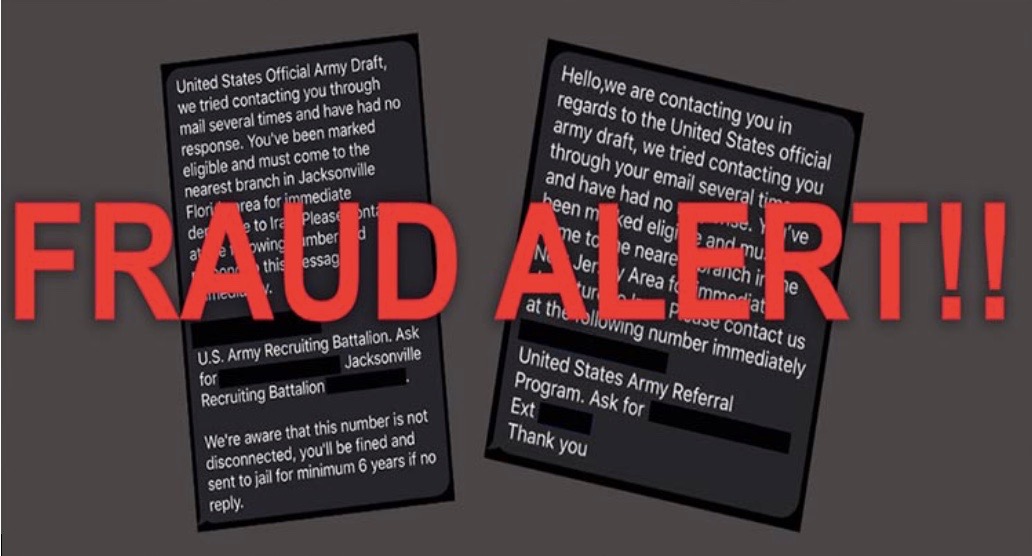ANDREA PLATE WRITES — Imagine how it feels. A young American male sees this cell phone text: “You’ve been marked eligible and must come to the nearest branch in the area for immediate departure to Iran.” That actually happened, this past week, to draft-age men across America.
The text was a hoax, of course — not the kind referred to by the President of the United States, regarding the investigation into his alleged abuse of power. Not the literary kind, like the infamous 1983 case of the fake Hitler diaries. This hoax was a false command in the name of the U.S. Army.
Said Lisa Ferguson, media relations chief of the U.S. Army Recruiting Command: “They are completely fake….We have no way of knowing, you know, why people are getting them or who’s being sent the text[s].”
Who would do such a thing?
Clearly, the prankster was no Arthur Fleck– that crazed genius, that masterful, misanthropic manipulator of “The Joker” movie, played chillingly by actor Joaquin Phoenix. Indeed, the text messages were silly, even stupid. Words were misspelled. Punctuation was misused. “If anyone believed this if they received it, I’d hope even the recruiter would turn them away. Jeezus,” wrote one veteran on a popular veteran-centric Facebook page. Wrote another: “I received my notice nearly 2 years after I enlisted. My CO thought it was funny.”
Not everyone laughed. Some of the text messages contained Army recruiters’ real names. Some contained a menacing one-line addendum: “You’ll be fined and sent to jail for minimum 6 years if you do not respond.”
Meanwhile, cynics put a positive spin on the calls. “A smart recruiter will have them join now instead of waiting for the draft …. speaking from experience,” wrote a Vietnam Era veteran. “That happened to me in 1966 at Ft Worth.”
Many, however, mistook the fake texts for real. Just one day after the U.S. shot down Iranian icon Qasem Soleimani, the website of America’s Selective Service—that independent agency of the US government which maintains information on those potentially subject to conscription—crashed. Am I really being deployed, they asked? Should I get packing? Would the Individual Ready Reserves—those standby soldiers, so to speak—be plunged into active duty? Would children have to lose their dads? Spouses, their mates?
Even worse, would “stop-loss “orders — which require troops to wear the uniform well past the due dates on their contracts — be put in place? As one aging Vietnam vet put it, humorously: “We don’t have a draft, for all u scared civilians that talk a lot of macho s___!!!! We have a stop-loss, internal…Yes, the government owns ur ass.”
This was a different kind of war on terror, one waged in the hearts and minds of well-meaning men and women registered with the Selective Service, those thinking of signing up for the US Armed Forces– and those who love them, and want to keep them safe, at home.
Surely, these calls should not have rung true, for a number of reasons: 1) The draft ended in 1973, as did the Vietnam War. 2) Both stayed highly unpopular. 3) Registration with Selective Service is mandatory for all American men age 18-25; actual service is not; 4) The numerical size of the American military has steadily shrunk since World War II; 5) The U.S. President promised to pull the troops out of foreign soil, not to put more in; and 6) Men in uniform are not necessarily the most desired draftees these days; in some ways, recruits who can serve as cyber sleuths are better suited to today’s wars.
But fear has a way of clouding the truth. Or, conversely, of bringing it into better focus—particularly for young women. Might not some have breathed sighs of relief, knowing that phone texts calling them to duty had to be fake—because women, although cleared for combat now, don’t have to register with Selective Service?
Last month, President Trump signed anti-robocall legislation into law. According to Consumer Reports’ Maureen Mahoney, this was a “big victory… the key is requiring these phone companies to help stop the calls before they reach the consumer and do it at no additional charge.” Welcome news, indeed. If we cannot end the forever wars, if we cannot protect the troops abroad, we can at least defend against fake provocation. Real fears of real wars cause more than enough alarm.
___
Andrea Plate is senior advisor to Asia Media International and author of the new book MADNESS: IN THE TRENCHES OF AMERICA’S TROUBLED DEPARTMENT OF VETERANS AFFAIRS, Marshall Cavendish Asia International, February 2020.

